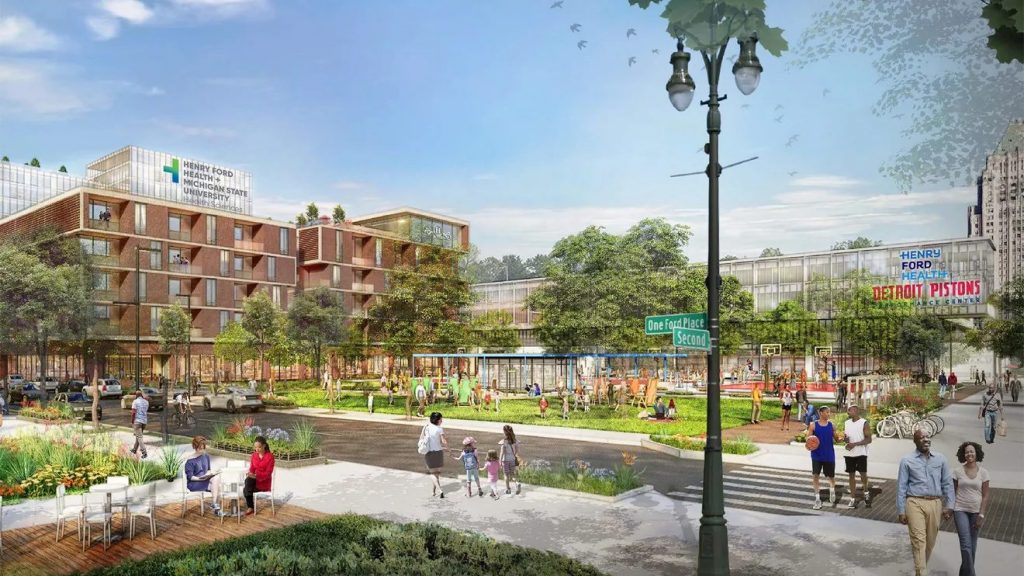Detroit City Council approves tax breaks, community benefits for Future of Health development
Despite push back from a number of community members, line items for the project largely passed with 6-3 council support.

Concept art of Henry Ford Health's expansion project in Detroit's New Center neighborhood.
Photo credit: Henry Ford Health
Detroit City Council has approved community benefits and around $300 million in tax incentives for the Future of Health development, which is planned for the New Center area.
Most of the line items passed with 6-to-3 support from councilmembers, with Angela Whitfield-Calloway, Mary Waters and Gabriel Santiago-Romero offering push back.
The $3 billion project is highlighted by a new 35-story hospital tower for Henry Ford Health, accompanied with 662 apartment units from the Detroit Pistons. Michigan State University is also a partner on the collaboration.
The city of Detroit requires developers provide a community benefits agreement to receive tax breaks. Santiago-Romero said she doesn’t feel the Future of Health’s deal goes far enough in protecting existing residents.
“Unfortunately, not being able to get to at least $3 million for affordable housing funds — I sent over three other requests for funding that, quite frankly, is not that much to ask for,” said Santiago-Romero.
Throughout the community benefits process, many residents complained the proposal flexed hospital-provided services over the housing initiatives residents asked for. Nevertheless, a Neighborhood Advisory Council voted to support a deal in December.
One concern was that the development would price nearby residents out of their homes. Henry Ford Health did agree to add an additional $500,000 to an affordable housing trust, bringing that fund up to $2 million.
In her no-vote, Whitfield-Calloway argued against giving long-term tax abatements without doing more to ensure goals are met in the first five years.
“Simply stated, not all developers, but some developers repeatedly promise the terms and conditions that are either delivered late or are completely ignored,” she said. “And a city council does not have the proper enforcement mechanisms or power to compel compliance.”
Approval of a “Transformative Brownfield” incentive will see Future of Health developers benefiting from a tax capture over 35 years.
Many residents used public comment to criticize the idea of the Detroit Pistons and billionaire owner Tom Gores receiving tax breaks to build apartment units — while a Rouge Park rec center Gores promised to pay for in 2022 is yet to break ground.
Rouge Park is in Councilmember Fred Durhal’s district. He defended that project before voting yes on the Future of Health.
“The groundbreaking will happen,” said Durhal. “But the reason why it’s taking so long is just showing the commitment of the community engagement that has taken place by the Pistons as well. And so I am glad to support (the Future of Health development) today.”
Trusted, accurate, up-to-date.
WDET strives to make our journalism accessible to everyone. As a public media institution, we maintain our journalistic integrity through independent support from readers like you. If you value WDET as your source of news, music and conversation, please make a gift today.
